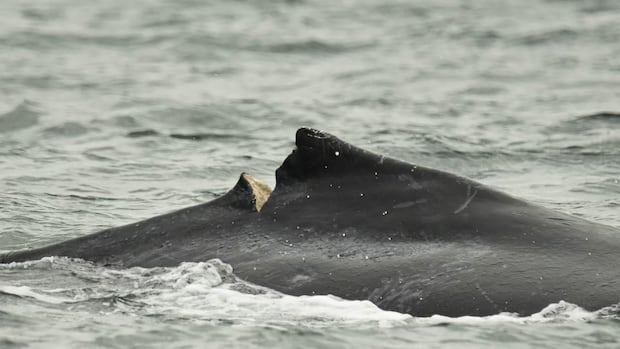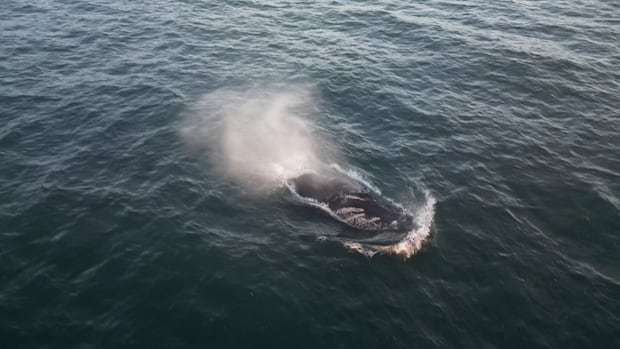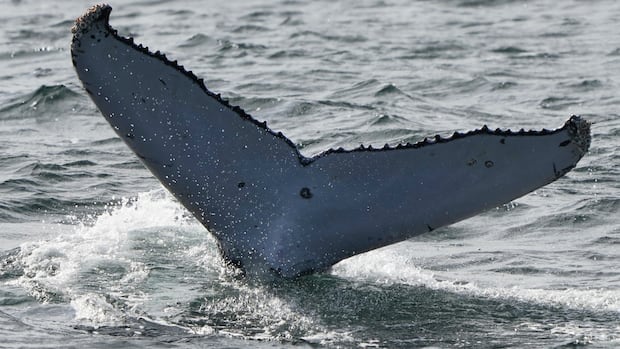Listen to this article
Estimated 4 minutes
The audio version of this article is generated by text-to-speech, a technology based on artificial intelligence.
An advocate for whales says many collisions between vessels and the animals are likely undetected or unreported as the Department of Fisheries and Oceans (DFO) investigates another death of a humpback whale off B.C.’s coast.
Caitlin Birdsall, executive director of the Marine Education and Research Society, says the whale was discovered Nov. 8 off Lasqueti Island in the Georgia Strait near the Sunshine Coast, and is the third confirmed death since late September.
She says it’s unclear what happened to the 21-year-old whale, which DFO has identified in photos as Polyphemus, a whale that migrates between Hawaii and waters off B.C.
Birdsall says can’t say if whale deaths are increasing because of ship strikes, because most dead whales are never found, but she can say that “there has been an increase in reporting over the last couple of months.”
DFO says in a statement it is working to understand the latest death, noting that vessel strikes “are one of the primary threats” to humpback whales, whose numbers have come back since commercial hunting stopped in the 1960s.
Christie McMillan, a researcher with the DFO who has been doing whale surveys in the Salish Sea since 2020, told CBC News there could be up to 400 humpback whales spending time in the area during the fall.
“The numbers of humpbacks should actually be decreasing — because people think that they are migrating down to warmer waters,” she said.
“And while that is starting to be true, certainly in the Salish Sea and especially in the Strait of Georgia, by far the most humpbacks are here in the fall, not in the summer.”
WATCH | Different whale suffers gash after collision:
Humpback calf suffers deep gash after ferry collision
A humpback whale calf nicknamed Skipper suffered a deep gash on its dorsal fin after a collision with a high-speed ferry near Vancouver’s English Bay. The incident has some calling for boats to take more caution on the water.
McMillan said it’s important for boaters to be aware that humpback whales are in B.C. waters all year, and it was sadly unsurprising to see so many dead whales over the last few weeks.
She said Polyphemus was known to frequent the part of the northern Strait of Georgia where his body was found, and scientists still need to conduct a necropsy to find the whale’s cause of death.
“He’s a whale that comes back to that area year after year and is known to the folks who are studying humpback whales in that area,” she said.
“And so when it comes to him … we do know that there have been some vehicles, like, some vessel collisions.”
3rd humpback dead
A dead humpback whale was found on Sept. 18 a day after a B.C. Ferries vessel reported a whale strike, while another whale was found dead on Oct. 25, shortly after the whale-watching company Prince of Whales announced that one of its vessels made contact with the animal.
On Oct. 17, a high-speed ferry reported striking a humpback whale near Vancouver in English Bay. Naturalists later confirmed that the vessel had struck a calf, leaving behind a deep gash near its dorsal fin.
WATCH | Humpback entangled in rope freed:
Rescuers free humpback whale entangled in 137 metres of rope near Nanaimo, B.C.
In this video from the Department of Fisheries and Oceans, a humpback whale is seen being freed from nearly 137 metres (450 feet) of fishing rope after a whale-watching boat found it in the Strait of Georgia. Correction: A previous version of this video included a headline that said the rope entangling the humpback whale was steel. In fact, according to DFO, the rope was Polysteel, which is synthetic.
Birdsall says there has been an increase in reported ship strikes recently because they involved vessels whose crew “are well aware of the legal requirement to report” and who also had passengers on board to “hold them accountable.”
She says whales hit by vessels might not die right away, but instead “succumb to injuries many weeks or months” later.

